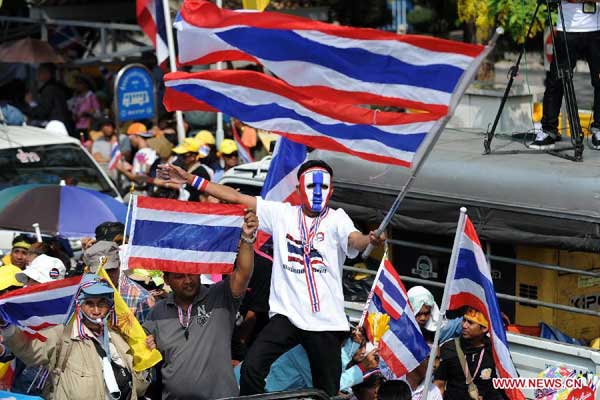 |
| Anti-government protesters pass a giant Thai national flag outside the Government House during a demonstration in Bangkok, Thailand, Dec. 9, 2013. Thailand's anti-government protesters on Monday demanded interim Prime Minister Yingluck Shinawatra to resign immediately and hand power to a "people's council." (Xinhua/Gao Jianjun) |
Thai King Bhumibol Adulyadej on Monday approved the dissolution of the House of Representatives and the holding of a general election slated for February 2, 2014, according to the Thai Royal Gazette.
Prime Minister Yingluck Shinawatra announced in a nationwide televised speech on Monday that parliament would be dissolved after large waves of anti-government protests.
"The situation seems likely to escalate to violence so the government has decided to return power to the people and let them decide through elections," she said.
Thailand's ruling Puea Thai Party said on Monday that Yingluck will run in the general election after she dissolved parliament, according to a Reuters report.
"She will definitely run as she has worked with the party all along. We dissolved parliament because we are confident ... We want the Democrat Party to take part in elections and not to play street games," Jarupong Ruangsuwan, head of the party, told reporters on Monday.
Protest leader Suthep Thaugsuban, who was a deputy prime minister but resigned from parliament to lead the rallies, dismissed the election as irrelevant.
"We have not yet reached our goal. The dissolving of parliament is not our aim," Suthep told Reuters.
The demonstrations were triggered by an amnesty bill, since dropped by Yingluck's ruling party, which opponents feared would have cleared the way for the return of ousted Thaksin, brother of Yingluck.
Aware Yingluck and Thaksin's allies would almost certainly win any election, Suthep has called for a "people's council" of appointed "good people" to replace the government.
Protest continued despite the house dissolution.
On Monday, protesters from more than 50 groups demonstrated at 18 meeting points and finally converged on nine routes in Bangkok.
Groups of protesters filled all the city's main streets waving national flags and blowing whistles on their march toward Government House.
Police estimated that about 150,000 protesters were converging outside the Government House, Reuters reported.
Of the 50 groups, nine are led directly by the opposition leaders the People's Democratic Reform Committee. They also include teachers and students from universities as well as workers from the Electricity Generating Authority of Thailand.
By offering compromise, Yingluck is actually taking a step forward and gaining advantage over the situation, believed Zhuang Guotu, dean of the Research School of Southeast Asian Studies at Xiamen University.
"By dissolving parliament, she can ease the level of conflict," he said. "On the surface, she seems to be accepting the call brought up by the opposition party, but actually she has confidence she'll gain victory in the next general election."
Whether the opposition will run in the general election remains in doubt.
Democrat Party leader Abhisit Vejjajiva sidestepped a question on whether his party would take part raised by Reuters, noting that the dissolution is "the first step toward solving the problem."
Protest leader Suthep has said he is not interested in a general election.
Voting could go ahead without the Democrats but it would not end the deadlock if they staged a boycott, Pavin Chachavalpongpun of Kyoto University's Center for Southeast Asian Studies, told Reuters.
"This is only a short-term solution because there is no guarantee that the Democrats will come back and play by the rules," Pavin said. "It seems like Thailand is going nowhere."
Song Qingrun, a research fellow from the China Institutes of Contemporary International Relations, told China National Radio (CNR) that the "street politics" in Thailand might lead to political chaos if demonstrators keep rallying until Yingluck is forced to resign as prime minister.
Yingluck supporters have stated they oppose any measures that force Yingluck to resign. If Yingluck did resign, they too might demonstrate and that might lead to conflict, he told CNR. "The chaos in Thailand is far from concluding. The dissolution of parliament won't be the last domino."
Agencies contributed to this story
 Heavy cargo flights taking off
Heavy cargo flights taking off In pictures: PLA's digital equipment
In pictures: PLA's digital equipment  Americans mark Thanksgiving Day with parades
Americans mark Thanksgiving Day with parades Love searching stories in cities
Love searching stories in cities  Shanghai shrouded in heavy fog
Shanghai shrouded in heavy fog Office ladies receive ‘devil’ training in mud
Office ladies receive ‘devil’ training in mud China's first nude photographer
China's first nude photographer Selected sports photos of the week
Selected sports photos of the week Treasure of Chinese culture- Nuo Dance
Treasure of Chinese culture- Nuo Dance  Youths in Night club: photo story
Youths in Night club: photo story Models dazzle at Int'l Yacht Model Pageant
Models dazzle at Int'l Yacht Model Pageant  Crystal scenery in China: Jilin fog glaze
Crystal scenery in China: Jilin fog glaze  Tianjin holds first pole dance championship
Tianjin holds first pole dance championship  Annual Santa Claus parade held in Canada's Montreal
Annual Santa Claus parade held in Canada's Montreal China's aircraft carrier passes through Taiwan Strait
China's aircraft carrier passes through Taiwan StraitDay|Week|Month